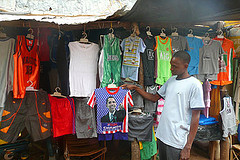In an earlier post I talked about sports leagues giving losing-team t-shirts to the poor in Africa and other places around the world through World Vision. Turns out there was a long online debate about whether these kinds of “gifts in kind” help or hurt the recipients. One article that seems to give a pretty straightforward overview of the situation is “What Happens to All Those Super Bowl T-Shirts?: A Guest Post by Dean Karlan” (Freakonomics, February 15, 2011). Karlan is co-author of More Than Good Intentions: How a New Economics Is Helping to Solve Global Poverty.
I say this article seems to give a pretty straightforward overview because the issue is complicated, and while I think I understand the problem (the biggest negative is the possible impact on the local textile economy) , I don’t know nearly enough to take sides or figure out a solution . Actually, what led me to this discussion was the serendipity of the Internet: I was searching for repat to see if it’s a legitimate abbreviation for repatriate, like expat for expatriate. (Answer: Not sure, but it should be.) That led me to the ProjectRepat site. ProjectRepat raises money for nonprofits by buying back used American T-shirts in Africa and then reselling them in the US. They explain that most of the shirts donated to non-profits in the US are baled up and sold for “pennies on the pound” and shipped to places like Africa to be resold in local markets. (I remember that as a college student I volunteered at the local Salvation Army, helping bundle up similar bales of clothing.) ProjectRepat then buys some of them back, adds their own screen-printed label, and resells them to US customers for $25 apiece. It’s an ironic and hip way to raise funds and draw attention to the situation. They also sell bags, scarves, and other items made by Kenyans from upcycled T-shirts. It was when I clicked on some of the news articles about their work that I found one at UN Dispatch: “Fighting Bad Aid by Selling Second-Hand T-Shirts Back to Americans” (May 17, 2011), in which Penelope Chester writes about the World Vision controversy and then draws attention to ProjectRepat. It’s interesting to note that on ProjectRepat’s FAQ page, they address the question of whether used T-shirts in Africa are destroying local markets:
. Actually, what led me to this discussion was the serendipity of the Internet: I was searching for repat to see if it’s a legitimate abbreviation for repatriate, like expat for expatriate. (Answer: Not sure, but it should be.) That led me to the ProjectRepat site. ProjectRepat raises money for nonprofits by buying back used American T-shirts in Africa and then reselling them in the US. They explain that most of the shirts donated to non-profits in the US are baled up and sold for “pennies on the pound” and shipped to places like Africa to be resold in local markets. (I remember that as a college student I volunteered at the local Salvation Army, helping bundle up similar bales of clothing.) ProjectRepat then buys some of them back, adds their own screen-printed label, and resells them to US customers for $25 apiece. It’s an ironic and hip way to raise funds and draw attention to the situation. They also sell bags, scarves, and other items made by Kenyans from upcycled T-shirts. It was when I clicked on some of the news articles about their work that I found one at UN Dispatch: “Fighting Bad Aid by Selling Second-Hand T-Shirts Back to Americans” (May 17, 2011), in which Penelope Chester writes about the World Vision controversy and then draws attention to ProjectRepat. It’s interesting to note that on ProjectRepat’s FAQ page, they address the question of whether used T-shirts in Africa are destroying local markets:
This is an interesting question, and one that we will continue to explore as we grow as a company. We’ve heard a lot of different arguments. On the one hand, an abundance of inexpensive secondhand clothing does prevent local entrepreneurs and textile companies from starting their own businesses. On the other, it has created millions of small businesses (from clothing vendors, to seamstresses, to those packaging the clothing), and provides inexpensive clothing for those who otherwise might not be able to afford it at full price.
[the photo was taken in San, Mali: “San Market” by Janet Goldner, used under a Creative Commons license]
